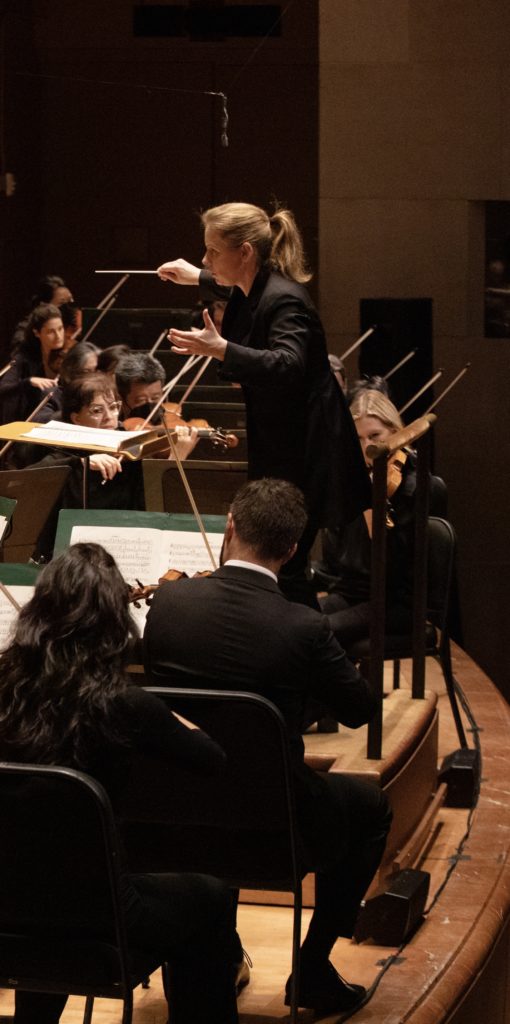New opens Dallas Symphony season with a powerful and evocative “Planets”

The Dallas Symphony Orchestra opened its 2022-23 Classical Series Thursday night with a program of rousing works by Rachmaninoff, Holst, and DSO composer-in-residence Angélica Negrón. Led by principal guest conductor Gemma New, the concert certainly achieved the goal of welcoming concertgoers back into the Meyerson Symphony Center with equal parts gusto and artistic daring.
New—whose modus operandi at the rostrum is prone to extravagant interpretive stylings and dynamic expressionism—proved a sure steward with Negrón’s What Keeps Me Awake.
Composed in 2008, this seven-minute tone-poem is ethereal and effusive in its depiction of a sleepless night. She describes the piece as an “exploration of and reflection on the creative process itself,” and particularly, the mental, emotional, and physical vexations caused by too many open-ended ideas colliding into one another.
New and the DSO were sympathetic and purposeful in their delivery of the material, with a shrewd grasp of Negrón’s delicate and shifting dynamics. The orchestra moved ably through the overlapping themes of the work’s four main sections, marked by flittering winds, shimmering percussion, and sumptuous string melodies. Tutti passages were tempered in volume while maintaining a whimsical balance of colors. The ambiguous conclusion was unnerving yet reassuring with winds, horns, and piano rapping single-note motifs on a steady decrescendo.
Sergei Rachmaninoff’s evergreen Rhapsody on a Theme of Paganini followed with guest pianist Olga Kern as soloist. Composed in 1934, Rachmaninoff’s Rhapsody is suffused with Romantic-era virtuosity in the composer’s imaginative setting of 24 variations of Niccolò Paganini’s invention—along with an introduction and statement of the original theme.
Kern provided ample showmanship and the big musical personality that is a requisite in this work. After some declamatory banter between ensemble and soloist in the work’s introduction, the piece bounded onward with ample amounts of verve. With alluring technique and a beguiling stage presence, Kern moved deftly through the dizzy scales, turns, and octaves that characterize the variations of the beginning and ending sections. Likewise, her personalization on the material through the slower middle variations provided a wealth of color and texture. And, with New and the DSO in tight cohesion, the performance of Rachmaninoff’s Rhapsody earned a roaring ovation, complete with two encores from Kern.
The second half of the program was devoted to Gustav Holst’s The Planets—a symphonic suite comprised of seven movements embodying the astrological and mythological associations of the planets in our solar system, minus Earth (Pluto is also omitted since in 1914 the planet had not yet been discovered.)
Here, the shifting moods and characters of that Holst assigned to each movement highlighted some of the deficits in New’s conducting style. The slow, beautifully eerie flute passages of “Venus” were set effectively against shimmering strings, however—while entertaining to watch—the march-like opening movement, “Mars,” brought moments of rhythmic disconnection across the ensemble with tuttis that were overzealous. Likewise, the scherzo of “Mercury” felt more frenzied than fleet and charming.
New was at her best in the final movement, “Neptune, the Mystic,” with an artful and sterling balancing of orchestra, organ, and women’s choir. New unerringly brought out the poignance and mystery, drawing out beautiful harp and string melodies. Singing offstage, the choir provided an evocative touch that celebrated the Meyerson’s acoustic versatility and the DSO’s overall artistic acumen.
The program will be repeated 7:30 p.m Friday and Saturday. dallassymphony.org